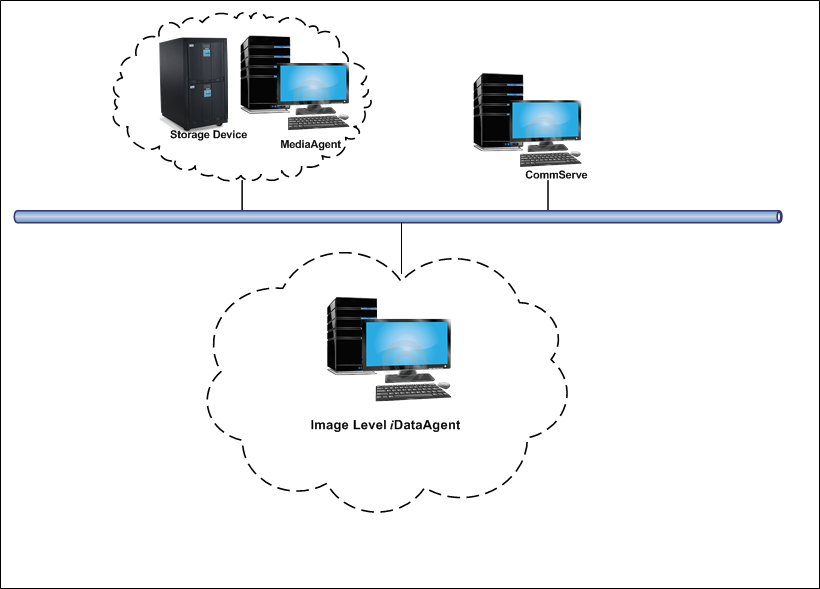Deprecated
-
This product is deprecated in this release. This functionality is now available using block-level backup.
-
New installations for this product are not supported in this release. Upgrade is supported to perform restores only. For instructions on transitioning from Image Level to block-level backups, see Transitioning from Image Level to Block-Level Backups.
See Deprecated Features, Products, and Platforms for information on deprecated products.
Introduction
The Image Level iDataAgent backs up complete volumes or mount points and restores them using volume level restore; for certain operating systems it is also able to restore folders and files using a file level restore. Generally, only blocks that contain data are backed up.
The server downtime is almost completely eliminated by capturing an image of a production server's disk with data snapshot technology (e.g., Snap), and then using the Image Level iDataAgent to back up the snapshot.

Key Features
The Image Level iDataAgent offers the following key features:
Simplified Data Management
The Image Level iDataAgent enables easy management of all the image data in your environment, by providing a singular approach to manage the data using the same unified console and infrastructure.
Backup and Recovery Failovers
In the event that the MediaAgent used for the backup or recovery operation fails, the backup is automatically resumed on an alternate MediaAgents. In such cases, the backup or restore job does not restart from the beginning, but resumes from the point of failure. This is useful for backups and restores of large amount of file system data.
In the event that a network goes down, the backup and recovery jobs are resumed on alternate data paths. Similarly, in the event of a device failure, the jobs are automatically switched to alternate disk and tape drives.
Efficient Job Management and Reporting
You can view and verify the status of backup and recovery operations from the Job Controller and Event Viewer windows within the CommCell Console. You can also track the status of the jobs using Reports, which can be saved and easily distributed. Reports can be generated for different aspects of data management. You also have the flexibility to customize the reports to display only the required data and save them to any specified location in different formats. For example, you can create a backup job summary report to view at-a-glance the completed backup jobs.
In addition, you can also schedule these reports to be generated and send them on email without user intervention.
For more information on different types of reports, see Reports Overview.
Block-Level Deduplication
Deduplication provides a smarter way to store data by identifying and eliminating the duplicate items in a data protection operation.
Deduplication at the data block-level compares blocks of data against each other. If an object (such as, file, database) contains blocks of data that are identical to each other, then block-level deduplication does not store the redundant data, which reduces the size of the object in storage. This reduces the size of the backup data copies on both the disk and tapes.
Snapshot Support
The Image Level iDataAgent is designed to work in conjunction with the following snapshot engines, which provide snapshot functionality for data backup operations:
-
VSS for the Image Level iDataAgent
-
QSnap for the Image Level iDataAgent
Terminology
|
Client |
The computer in which the iDataAgent is installed and contains the data to be secured. |
|
Agent |
Software module that facilitates backup and restore operations. |
|
Subclient |
The data to be backed up. |